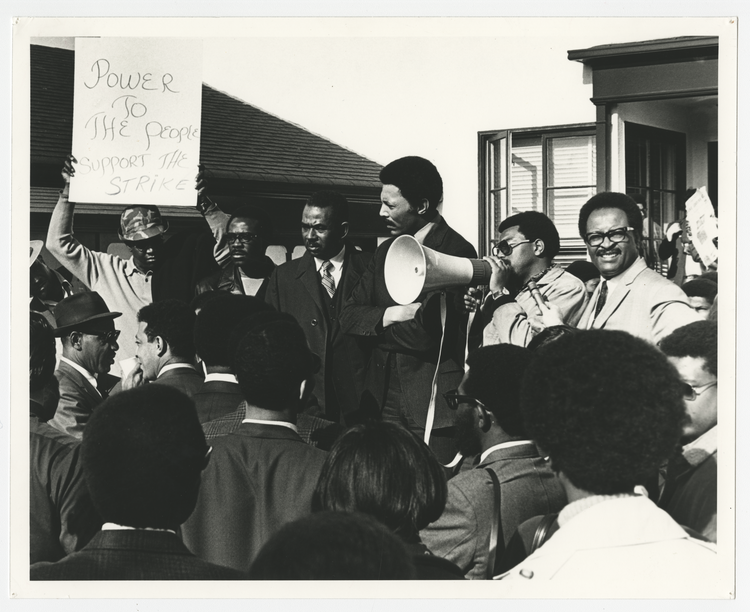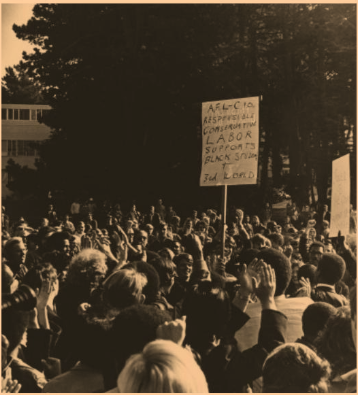Over 50 Attend SFSU’s Discussion of Protest Film “Agents of Change”
By Daphne Young
dyoung9@mail.ccsf.edu
On Wednesday night, Dec. 1, San Francisco State University hosted a virtual screening of the student protest documentary film, Agents of Change.
56 students and guests from SFUSD and City College of San Francisco attended the online screening, and had a chance to hear from the directors of the film, along with one of the frontline participants, Dr. Ramona Tascoe.
Tascoe attended SFSU back in 1967-68, and took part in the student protests which helped bring about the college’s Ethnic Studies Department.
“Agents of Change” is a riveting historical documentary about two separate protests that took place on college campuses, on opposite sides of the country during a pivotal year, 1968.
The film begins with the 5-month long student protests at San Francisco State University. Then, it transitions to the East Coast, to tell the story of another historic protest that happened at the Ivy League school, Cornell University.
Filmmakers, Frank Dawson and Abby Ginzberg, were students at Cornell University then, and they bring two unique vantage points to the April 23, 1968 student takeover of Willard Straight Hall, at Cornell.
Dawson, a native New Yorker, was inside the building when the small group of Black students responded to a cross burning the night before, and took over the student union.
“We all ended up at a building that we commandeered as our headquarters, during the night,” said Dawson. “It was parents’ weekend, and so in the morning, we woke our parents up, asked them to leave and told them we were taking over the building,” he said, adding, “They left, and then we locked the doors.”

What transpired next was historic. A group of white students, who supported their effort, marched around the student union and protested on behalf of the Black students.
Co-Director, Abby Ginzberg, was a sophomore at the time and she was one of those students protesting outside the building.
“Being on the outside at Cornell, is why we wanted to make the movie because the story had been so misrepresented in the press,” said Ginzberg. “The level of empowerment of being a part of a group protest made you think you could change the world. The film is better because it’s a joint perspective from students on both sides of this historic event.”
The award-winning documentary, “Agents of Change,” is presented in a mix of nostalgic black and white film footage and photos, along with modern day interviews, photos, and video in color.
Plus, the soundtrack reads like a who’s- who from classic music hits of the 1960s. From James Brown to Jimi Hendrix, the soundtrack takes viewers back down memory lane.
“There are 12 original songs in the film, and that cost a lot of money. But, music is a character in this film,” said Dawson.
The narration is also a driving force in the film. Actor/activist Danny Glover, along with author Alice Walker, and a whole host of real-life “Agents of Change,” like Dr. Ramona Tascoe, of UCSF, lend their voices to help tell the story about what happened on both of these college campuses, to help bring diversity to traditional white college campuses.
“In the late 1960’s colleges all across the country were dealing with opening up the doors to admit more students of color,” said Tascoe. “And, we were expected to assimilate. But, we chose to bring our own culture into these schools and NOT assimilate.”
The character’s in the film were students during the civil rights, black power, and anti-Vietnam war movements. It was a pivotal time in American history.
“Participating in that event that day had a huge impact on me,” said Co-Director Abby Ginzberg.
“It speaks to the choices I made in my life. We were young and we were making decisions based on our own strategies,” said Ginzberg, who recalled, “Both the people inside and outside that building have led lives to commit to activism and it helped put us on to our paths in life. We were influenced permanently,” said Ginzberg.
According to Ginzberg “Putting yourself on the line for the principles you believe, is an important lifelong lesson. I learned a lot and those lessons have guided me throughout my career. I’m glad people didn’t just leave me in the library,” adding, “I saw that something needed to happen, and I participated.”
During the Q&A Session, after the screening on Wednesday night, City College Journalism Chairman Juan Gonzales, who served as a moderator for the event, also told viewers how the student protests at SFSU during that era impacted him.
“One of the students in the movement asked me what I was going to do with my skills, for the community,” said Gonzales. “But, before that moment, I hadn’t thought about what I could do.”
Gonzales said it was an eye opening experience for him. During that time, he was a student reporter at SFSU. He later went on to become the publisher of El Tecolote, an award-winning Spanish community newspaper, created in the Mission District.

The screening was an opportunity for modern day college students to view the film and ask their questions directly to some of those who took part in historic events on college campuses back in the 1960’s.
“This film is a great way to show young people that many of the race issues back then are still relevant today,” said co-director Dawson. “Some 50 years later, many of the same demands are re-surfacing at college campus protests today.”
The 66 minute film, “Agents of Change,” examines the untold story of racial conditions on college campuses across the nation in the 1960’s, that led to many student protests.
“This film has also given us an opportunity to go all around the country to college campuses and talk to young people about the experiences we had,” said Dawson. “And, it’s so important that we continue this battle that was started back then, because the battle hasn’t been won, yet.”
“Agents of Change,” is now streaming on Vimeo for $9.99. And, it’s well worth every cent.
Power to the People!
